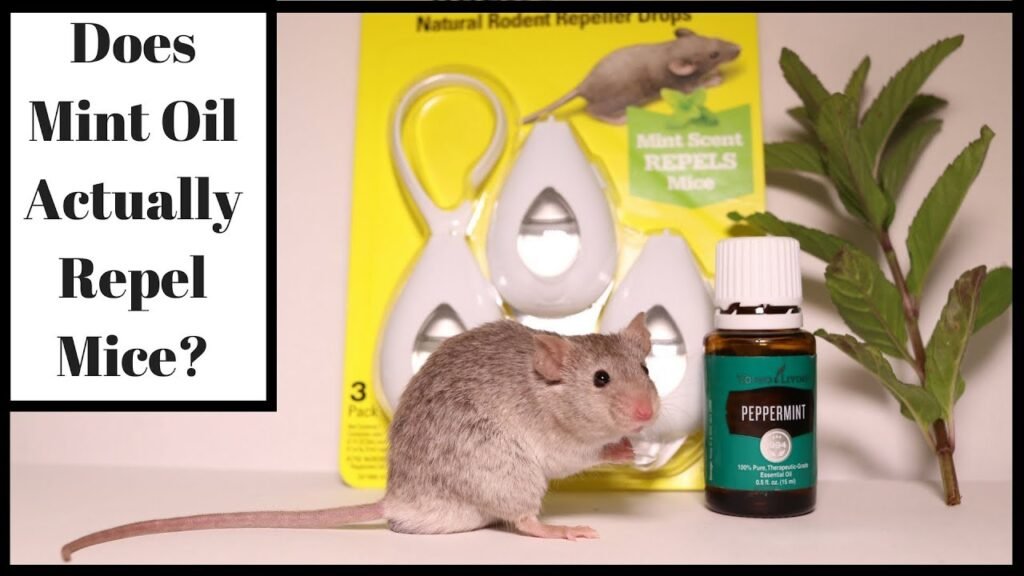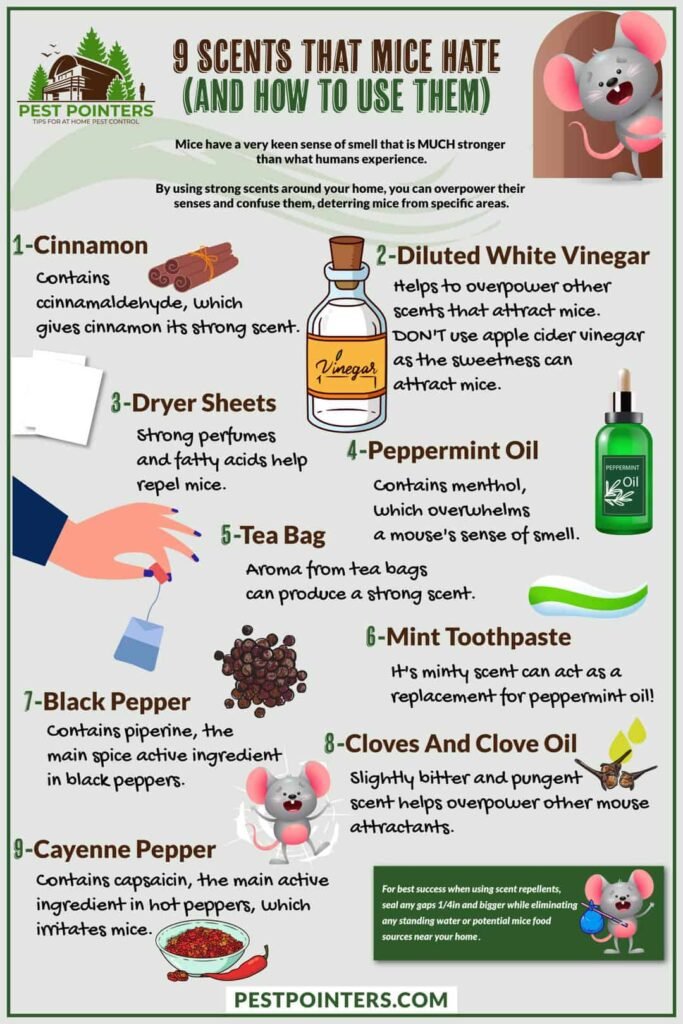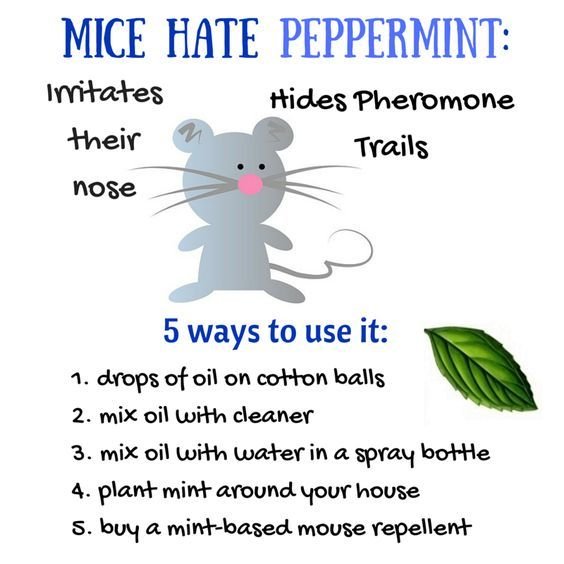If you’re tired of having unwanted furry guests scurrying around your home, you may have wondered if peppermint oil could be the solution. This article explores the age-old question: does peppermint oil truly repel mice?


The Science Behind Peppermint Oil
What is peppermint oil?
Peppermint oil is a natural essential oil derived from the peppermint plant, scientifically known as Mentha piperita. It is extracted through a process of steam distillation from the leaves and stems of the plant. Peppermint oil has been used for centuries for its numerous health benefits and refreshing scent. In recent years, it has gained popularity as a potential repellent for mice and other rodents.
How does it work as a repellent?
The active compounds in peppermint oil, such as menthol and menthone, have been found to possess strong repellent properties. The strong scent of peppermint oil is known to be highly unpleasant to mice. When mice come into contact with peppermint oil, they are repelled by the scent, which acts as a deterrent to keep them away from the treated areas.
Research studies on peppermint oil and mice
Several research studies have been conducted to investigate the effectiveness of peppermint oil as a mouse repellent. One study published in the Journal of Pest Management Science found that peppermint oil showed significant repellent effects on mice in laboratory settings. However, it is important to note that these studies have been conducted in controlled environments and may not accurately represent real-life situations. Further research is needed to fully understand the effectiveness of peppermint oil as a mouse repellent in various settings and scenarios.
How to Use Peppermint Oil to Repel Mice
Choosing the right peppermint oil
When selecting peppermint oil for mouse repellent purposes, it is crucial to choose a high-quality, pure essential oil. Look for oils that are 100% pure and therapeutic grade. Avoid oils that contain additives or synthetic fragrances, as these may not be as effective in repelling mice.
Methods of application
There are several methods of applying peppermint oil to repel mice. One common method is to soak cotton balls or cotton pads in peppermint oil and place them in areas where mice are likely to enter or frequent. Another approach is to create a peppermint oil deterrent spray by diluting the oil with water and spraying it in affected areas. Additionally, peppermint oil can be used in diffusers or added to cleaning solutions to create a scented environment that deters mice.
Creating a peppermint oil deterrent spray
To create a peppermint oil deterrent spray, combine 10-15 drops of peppermint oil with one cup of water in a spray bottle. Shake the bottle well to ensure proper mixing. Then, spray the solution in areas where mice are frequently seen, such as along baseboards, near entry points, or in attics or crawl spaces. Reapply the spray every few days or when the scent starts to fade.
Placing peppermint oil-soaked cotton balls
Another effective method is to soak cotton balls or cotton pads in peppermint oil and place them strategically in areas where mice are likely to cross, such as near food sources, in corners, or in dark hiding spots. The scent of the oil will repel mice and discourage them from approaching these areas.


Effectiveness of Peppermint Oil as a Mouse Repellent
Positive experiences and testimonials
Many individuals have reported positive experiences and success in using peppermint oil as a mouse repellent. They have noticed a decrease in mice activity and a reduction in infestations after implementing peppermint oil as a deterrent. These testimonials suggest that peppermint oil can be an effective natural solution for mouse control.
Factors affecting effectiveness
Several factors can influence the effectiveness of peppermint oil as a mouse repellent. The severity of the infestation, the size of the affected area, the specific species of mice, and the overall cleanliness and hygiene of the environment can all play a role in determining the efficacy of peppermint oil as a repellent. It is important to consider these factors when using peppermint oil for mouse control and to adjust the application methods accordingly.
Limitations and mixed results
While there are positive experiences and testimonials regarding the use of peppermint oil as a mouse repellent, it is essential to acknowledge that the effectiveness may vary. Some individuals may not experience the desired results, and mice may eventually become accustomed to the scent of peppermint oil. Additionally, peppermint oil alone may not be sufficient to completely eliminate mouse infestations. It should be used as part of an integrated approach to mouse control, including proper sanitation, exclusion techniques, and professional assistance if necessary.
Other Natural Mouse Repellents
Essential oils: alternatives to peppermint
Peppermint oil is not the only essential oil known for its pest repellent properties. Other essential oils, such as spearmint, eucalyptus, and lavender, have also been found to have varying degrees of effectiveness against mice. Experimenting with different essential oils or combining them may be beneficial in finding the most effective natural mouse repellent for your specific situation.
Home remedies and herbal deterrents
In addition to essential oils, various home remedies and herbal deterrents can be used to repel mice. These include natural substances like vinegar, ammonia, and garlic, as well as specific plants and herbs known to repel rodents, such as sage, rosemary, and bay leaves. These remedies can be used in conjunction with peppermint oil or as alternatives depending on personal preferences and accessibility.
Ultrasonic devices and electronic repellents
Ultrasonic devices and electronic repellents are also available options for mouse control. These devices emit high-frequency sounds or vibrations that are claimed to repel mice and other rodents. However, their effectiveness is a topic of debate, with some people reporting positive results while others do not experience any significant deterrence. It is important to research and choose reputable products, as the market for electronic repellents can be saturated with ineffective or unreliable devices.


Common Myths and Misconceptions
Peppermint oil as a guaranteed solution
While peppermint oil has shown promise as a natural mouse repellent, it is not a guaranteed solution for every situation. Each infestation is unique, and what works for one person may not work for another. It is important to approach the use of peppermint oil with realistic expectations and consider it as part of a comprehensive approach to mouse control.
Repellent qualities of other mint varieties
Peppermint, as well as other mint varieties such as spearmint and pennyroyal, are often associated with mouse repellent properties. However, it is important to note that not all mint varieties possess the same level of effectiveness. Peppermint oil specifically, with its high concentration of menthol, has been found to be more potent in repelling mice compared to other mint oils.
Peppermint oil as a long-term deterrent
While peppermint oil can be effective in repelling mice in the short term, its long-term deterrence capabilities may be limited. Mice are highly adaptable creatures, and they may eventually become accustomed to the scent of peppermint oil. Regularly changing the location of peppermint oil-soaked cotton balls or regularly refreshing the scent of peppermint oil may help maintain its effectiveness over time.
Potential Side Effects and Risks
Skin irritation and allergic reactions
Peppermint oil, like any essential oil, can cause skin irritation or allergic reactions in some individuals. It is important to test a small area of skin for any adverse reactions before applying peppermint oil directly to larger areas of the body. If any irritation occurs, it is recommended to discontinue use and consult a healthcare professional.
Ingestion risks and poisoning
Peppermint oil is not meant to be ingested and should be kept out of reach of children and pets. Ingesting concentrated peppermint oil can result in poisoning and may cause adverse effects such as digestive issues, respiratory problems, or even organ failure. If accidental ingestion occurs, seek immediate medical attention.
Precautions for households with pets or children
When using peppermint oil as a mouse repellent in households with pets or children, it is important to take special precautions. Keep peppermint oil and any cotton balls or soaked materials out of reach to prevent accidental ingestion. Additionally, monitor pets and children closely to ensure they do not develop any adverse reactions or allergies to the scent of peppermint oil.


Practical Considerations and Tips
Using peppermint oil in conjunction with other methods
To maximize the effectiveness of peppermint oil as a mouse repellent, it is often recommended to combine its use with other mouse control methods. This could include sealing off entry points, maintaining proper sanitation practices, and implementing exclusion techniques to prevent mice from entering or re-entering the premises. By taking a comprehensive approach, peppermint oil can play a valuable role in deterring mice and minimizing the risk of infestations.
Maintaining cleanliness and hygiene
Proper cleanliness and hygiene are essential in preventing and controlling mouse infestations. Regularly clean and declutter areas where mice are likely to hide or nest, such as kitchens, pantries, basements, and attics. This will help eliminate potential sources of food, water, and shelter for mice, making the environment less attractive to them.
Regular inspection and exclusion techniques
Regularly inspecting your property for any signs of mice and implementing exclusion techniques can significantly contribute to effective mouse control. Seal off any cracks, gaps, or holes in walls, doors, and windows, as mice can squeeze through incredibly small openings. By preventing access to your home and eliminating potential entry points, you can minimize the likelihood of a mouse infestation.
Professional Exterminators’ Perspective
Views and experiences of pest control experts
Professional exterminators often encounter mouse infestations and have firsthand experience in dealing with these pests. While peppermint oil may have some repellent properties, most professionals view it as a complementary or temporary measure rather than a standalone solution for mouse control. They recommend integrating multiple methods, including traps, exclusion techniques, and professional-grade products, for a comprehensive and effective approach to mouse extermination.
Peppermint oil as a complementary or temporary measure
From a professional perspective, peppermint oil can be seen as a complementary or temporary measure to supplement other mouse control methods. While it may provide some level of deterrence, it is often used in conjunction with more robust approaches to maximize the chances of successful mouse elimination.
Recommended integrated pest management strategies
Professional exterminators often advocate for integrated pest management (IPM) strategies when dealing with mouse infestations. This approach combines various methods, including proper sanitation, exclusion techniques, targeted trapping, and, if necessary, the use of professional-grade pesticides. By customizing the approach based on the severity and unique characteristics of each infestation, pest control experts can effectively eliminate mice and prevent future re-infestations.


Summary and Conclusion
Peppermint oil has shown promise as a natural mouse repellent, thanks to its strong scent and the repellent properties of its active compounds. While there are positive experiences and testimonials regarding the use of peppermint oil, its effectiveness may vary depending on various factors such as the severity of the infestation, the size of the affected area, and the overall cleanliness of the environment. It is important to approach the use of peppermint oil as part of a comprehensive approach to mouse control, including proper sanitation practices, exclusion techniques, and professional assistance if needed.
While peppermint oil is a popular natural mouse repellent, there are also other alternatives available. Essential oils like spearmint, eucalyptus, and lavender have been found to have varying degrees of effectiveness against mice. Home remedies and herbal deterrents, as well as ultrasonic devices and electronic repellents, are additional options for mouse control.
When using peppermint oil, it is important to consider potential side effects, such as skin irritation or allergic reactions, and take precautions in households with pets or children to prevent accidental ingestion. It is also advisable to use peppermint oil in conjunction with other methods, such as regular inspection, exclusion techniques, and maintaining cleanliness and hygiene.
From a professional exterminator’s perspective, peppermint oil is often viewed as a complementary or temporary measure rather than a standalone solution for mouse control. Integrated pest management (IPM) strategies, which combine various methods tailored to each specific infestation, are recommended by pest control experts for effective mouse elimination.
In conclusion, while peppermint oil holds potential as a mouse repellent, its effectiveness may vary, and it should be used as part of a comprehensive mouse control plan that takes into account the unique characteristics of each infestation. By considering all available options and seeking professional advice when needed, you can successfully manage mouse infestations and create a rodent-free environment.
References
- Journal of Pest Management Science: “Bioactivity of three Mentha essential oils against the house mice, Mus musculus L.” (2003) – S. Abou-Taleb, A.M. Al Ola, M.E.M. Ibrahim, and A.M. Emara.
Note: This article is for informational purposes only and does not constitute professional advice. Always consult with a pest control professional or healthcare provider for specific guidance and recommendations.
Your Expert in Animal Control and Extermination. Trust our experience for humane, effective pest management, protecting your property and ensuring peace of mind with Michael S.

